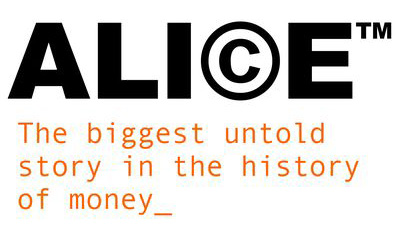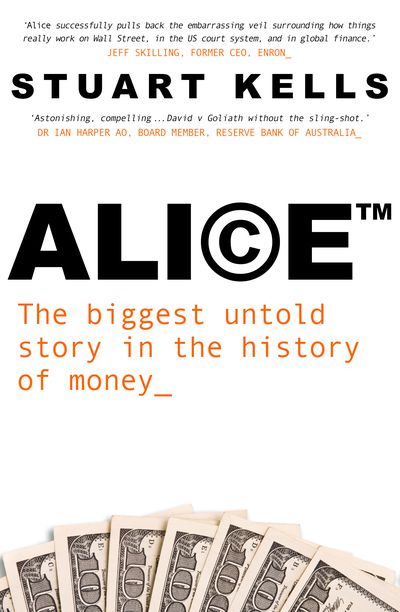
- Free Article: No
- Contents Category: Finance
- Review Article: Yes
- Article Title: Alice Corp
- Article Subtitle: A study of financial entropy
- Online Only: No
- Custom Highlight Text:
In the last decade, Stuart Kells has become one of Australia’s most versatile and fecund non-fiction writers, responsible for a variety of diverting histories, of enterprises, institutions, and ideas. His thoroughly readable The Library: A catalogue of wonders (2017) was shortlisted for a Prime Minister’s Award; his Shakespeare’s Library: Unlocking the greatest mystery in literature (2018) felt rather more padded, if not unenjoyably so. Books about Argyle Diamonds (2021) and Melbourne University Publishing (2023) have been welcome. I imagine him in a medieval artisanal workshop, a kind of booksmith studiously occupied in multiple, simultaneous pursuits.
- Featured Image (400px * 250px):

- Alt Tag (Featured Image): Gideon Haigh reviews ‘Alice™: The biggest untold story in the history of money’ by Stuart Kells
- Book 1 Title: Alice™
- Book 1 Subtitle: The biggest untold story in the history of money
- Book 1 Biblio: Melbourne University Publishing, $35 pb, 272 pp
- Book 1 Cover Small (400 x 600):

- Book 1 Cover (800 x 1200):

A few years ago, Kells found himself seated at a dinner next to a softly spoken grey-haired man, Ian Shepherd, who turned out to have an interesting story to tell. After a career at Commonwealth Bank and McKinsey, Shepherd had established a company, Alice Corp, to market a trading platform on which financial institutions could buy, sell, clear, and track complex, over-the-counter derivatives with the minimum of so-called ‘Herstatt risk’ – the danger of a settlement failure, named after a German bank that closed fifty years ago when it could not deliver on foreign exchange trades.
Their conversation began to sound like a book when it emerged that Alice Corp had lately fought in the US Supreme Court for the patentability of its technology against a cabal of megabanks operating their own consortium, CLS Bank International. Better yet, Shepherd was a confidant of the spiritedly dissident novelist Kate Jennings and a trenchant critic of the mighty firm JP Morgan. A serendipitous encounter indeed: it was as if Darryl Kerrigan had wandered into Michael Lewis’s The Big Short: Inside the Doomsday Machine (2015).
And in Lewis’s hands it might have been, but for all Kells’s intelligence and diligence, the tale in in Alice™ never rises to the level of drama. The texture of the backdrop and the significance of the integrity of financial markets notwithstanding, Alice v CLS (2014) concerned the rather bloodless issue of whether the application of computers to an escrow service rendered it worthy of patent protection. As McGuffins go, it’s not exactly a death ray or a time machine.
Alice, furthermore, had no relevant trading activity in relation to the four patents in question, while CLS Bank, having commenced operations in September 2002, handled $US5 trillion in settlements each day. Whatever the merits of Alice’s jiggery-pokery, and whatever the self-interest of CLS’s big bank owners, it is not difficult to see why the Supreme Court unanimously preferred Goliath to David. Kells’s proposition that the ‘fix was in’ is circumstantial at the very best, especially given that the decision met with strong approval from those companies in various industries that had been menaced by patent trolls.
Kells writes soundly about the quotidian business of managing the tides of global finance, the levees and sluices that direct monies hither and yon. He is alert to developments and technological impacts. But books such as these succeed or fail on the quality of their characters, and those in Alice™ are not quite arresting or colourful enough to engage us: Shepherd, in particular, seems a pleasant enough cove, but no maverick or seer.
There is also a dearth of the telling anecdotes that would normally be the staff of life to such a narrative. This leaves Kells straining for effect. There’s the ‘tip of the iceberg of confusion’; there’s the ‘big danger’ that continues ‘to percolate at the heart of the international financial system’ from a global financial settlement regime ‘as Dickensian as a Christmas turkey’. I remain unclear what this last one means.
‘The overarching trend was an unstoppable, implacable, all-encompassing process of financial entropy: breaking down boundaries and distinctions, removing restrictions on who could do what, and unbundling the components of contracts and transactions.’ This sounds like Ned Beatty’s monologue in Network (‘There is only one holistic system of systems, one vast and immane, interwoven, interacting, multivariate, multinational dominion of dollars’), except that Paddy Chayefsky wrote it better. And settlement systems always emerge in arrears of fast-growing markets: the New York Stock Exchange all but collapsed after what began as a paperwork snarl following bull and bear phases in 1970, forcing a sixth of the street’s firms out of business.
Alice™ really only kicks along when Shepherd strikes up a friendship with Jennings, whose canonical Moral Hazard (2000) is one of the few Australian workplace fictions worth the name. She is wise, waspish, and droll. When admirers praise her novel for the passages where the banker Mike foretells the fate of complex derivatives in environments of asymmetric information and/or limited liquidity, she rightly retorts: ‘Mike’s comments do not make me prescient. Anyone with half a brain could have figured this out.’ But Kells has also had the bad idea of quoting verbatim from emails between Shepherd and Jennings, and their superfluous detail bogs the story when it should be powering ahead.
An unexpected cameo is from Jeff Skilling, disgraced CEO of the notorious financial suicide note Enron. Shepherd became a sympathetic visitor to the imprisoned Skilling, convinced that they were both victims of bank connivance. The proposition that Enron was the victim of an old-fashioned ‘run on the bank’ by its lenders rather than falling prey to its own hubris, headlong expansion, toxic culture, and perverse incentives is counter-intuitive and original, but should we really be surprised that Skilling seized on and endorsed it? The analysis also leaves too much out: for example, money centre banks did not cause Enron’s traders to sabotage the electricity market in California in order to stoke volatility and trading opportunities. In any event, is it not leadership’s responsibility to sense weaknesses and susceptibilities? That’s the world’s smallest violin, and it’s playing just for Jeff Skilling.
In the wake of Going Infinite (2023), his disarmingly sympathetic retelling of the collapse of the cryptocurrency exchange FTX, Lewis has faced criticism because of the formulaic nature of his hugely successful business narratives. The clichés are of a lower key in Alice™, but they should have been interrogated more vigorously. Nor, satisfying as they are, does every subject presenting itself have to be a book. Kells has a broad gauge mind, but could afford to think more narrowly.


Comments powered by CComment